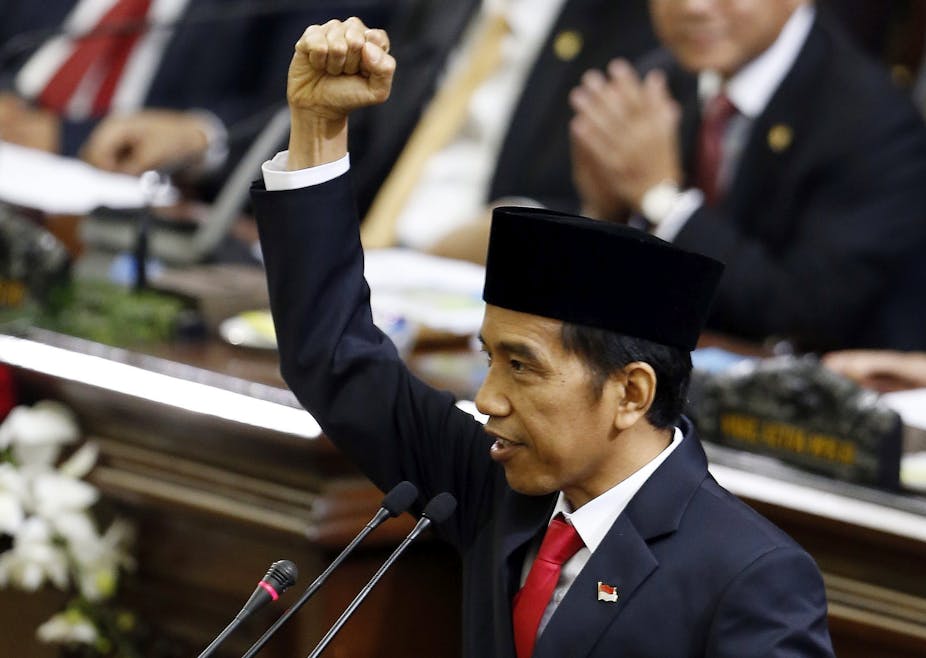In his speech after being sworn into office, Indonesian President Joko Widodo yesterday called for Indonesians to “work, work and work”.
Jokowi, as the president is popularly known, also has to work hard to set up a cabinet of ministers capable of implementing his reformist agenda, which includes cleaning up entrenched corruption.
Below is a Q&A with Djayadi Hanan, Paramadina University lecturer in political science.
How important is the choice of cabinet ministers for Indonesia’s reform and democracy?
The cabinet ministers will determine to what extent the new president can implement his main agendas. Jokowi has plans to improve human resource development; to increase the level of economic growth to around 7%; and to further eradicate corruption.
The cabinet ministers should be individuals who are not only professionally capable but also clean. They must have a clear commitment to work and be people-oriented.
The ministers will determine whether or not the bureaucracy can be reformed and be oriented towards reform. The bureaucracy to a large extent is still the remnants of the authoritarian era and its opposition to reform is obvious. The ministers can lead further reforms in all aspects of the bureaucracy’s activities and make sure these are implemented.
Will Jokowi be able to avoid transactional politics in choosing his cabinet ministers?
We will see that in his next steps. After choosing his cabinet ministers, he has to prove himself in his first 100 days’ programs and in his approach to cooperating with the opposing coalition.
Jokowi met with his defeated opponent in the presidential election, Prabowo Subianto, ahead of his inauguration. If we look at what he has done in the past week, we see that he could break the stagnancy of political communications by his party.
I think Jokowi has the capacity to act alone as himself. He managed to convince leaders from the opposing coalitions to meet and make sure that the conditions for his inauguration are conducive. He shows his capacity to act and make decisions in terms of how to communicate with other important political elites and veto players.
Transactional politics seems to be inevitable. He has announced that he will allocate about 16 ministerial posts to political parties supporting him. That alone is transactional. The main challenge in the future is to make sure that all ministers, including from political parties, can work fully under his directions.
Jokowi has said that he would prioritise domestic issues, but how might Indonesia’s role in global issues take shape under Jokowi?
His priority on domestic issues will automatically involve international actors, regionally and globally. His focus on maritime development, for instance, will touch issues related to neighbouring countries. Issues of development of fisheries, for example, will also be related to issues of how fishermen from other countries could fish in Indonesian sea or maritime areas.
He would also focus on democratic development in Indonesia. This issue will also be very much related to international relations. He would be cooperating for democratic promotion in the Southeast Asia region. On a more global scale, he could work to increase Indonesia’s role in democratisation in predominantly Muslim countries.
With Jokowi concentrating on domestic issues, Indonesia’s foreign policy will rely on a competent foreign minister. What is your analysis of the names floating around at the moment?
I think all those names are substantively capable and internationally well connected. Marty Natalegawa might have some advantages because he is the incumbent foreign minister and knows what to do in terms of making Indonesia have a greater role in creating an international arena which is more dynamic but balanced (dynamic equilibrium). But the choice will be up to Jokowi since it is his political decision.
How would Jokowi’s presidency affect Indonesia’s relationship with Australia?
Since Jokowi focuses very much on the involvement and participation of the people in his presidency, Indonesian diplomacy and relationship with other countries, including Australia, will be characterised more and more by the importance of public diplomacy. This is also to support his main domestic agendas, especially the importance of education and health.

